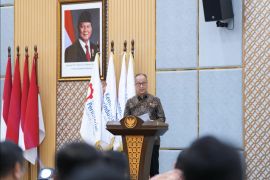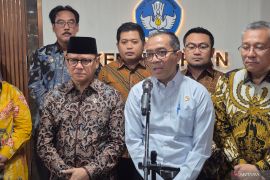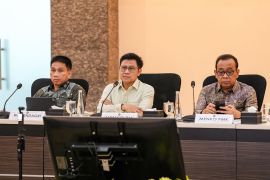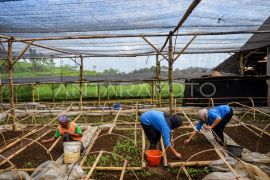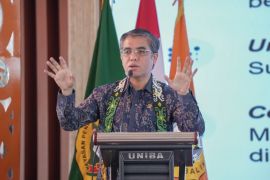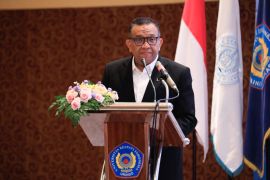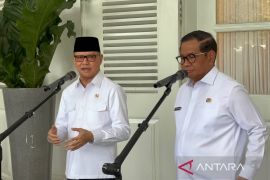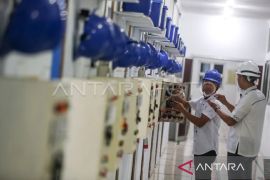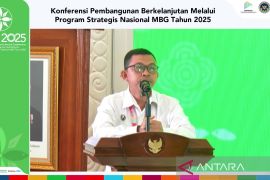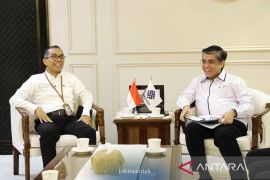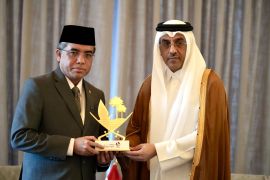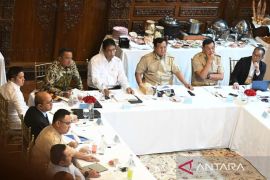One of the efforts to improve the quality of human resources is made through the promotion of the "`Link and Match" concept that is a competence-based education system.
All education units within the Ministry of Industry have implemented a competence-based curriculum system and are connected to and in accordance with the industry. This effort is proven to be able to produce skilled and professional human resources as required in the workforce today.
"We have nine Vocational High Schools, nine Polytechnics, and one Community Academy. They have become references for the development of vocational education because we have succeeded in building a truly competence-based education system and link and match with the industrial world," Secretary General of the Ministry of Industry Haris Munandar stated as quoted on the website of the Ministry of Industry, recently.
Each education unit within the Ministry of Industry specializes in certain industrial fields. This was facilitated through partnerships with several companies to harmonize learning theories with field practice.
"Hence, we already have a special learning module that fits the needs of the industry. In addition, the ratio of time we apply is 50 percent study at school or campus and 50 percent practice in the industry," the secretary general explained.
These efforts have been successful in helping to also develop small-scale enterprises (SMEs). Hence, House of Representatives` Commission VII Deputy Chairman Ridwan Hisjam had earlier stressed the importance of human resource development in the face of the Industrial Revolution 4.0.
The legislator opined that Indonesia should cooperate with industry players and foreign governments to improve the quality of vocational schools while simultaneously enhancing the labor mobility program to accelerate transfer of capabilities.
In the era of Industrial Revolution 4.0, cooperation patterns with various parties, including SMEs, should be carried out, especially in terms of innovation through a link and match concept.
To this end, "Link and match" business meeting activities among automotive component SMEs, Brand Holder Agents (APMs), and Large Industries at the Ministry of Industry was held on Tuesday (Nov 27) in Jakarta. It brought together at least 100 SMEs with 19 APMs and large companies.
SMEs came from several cities in Java, including Jakarta, Bogor, Depok, Tangerang, Bekasi, Karawang, Bandung, Pasuruan, Purbalingga, Yogyakarta, Tegal, Klaten, and Sidoarjo.
During the business meeting at the Ministry of Industry, 15 SMEs were ready to partner with three large industries. PT Dharma Polimetal, PT Mada Wikri Tunggal, and PT United Tractor Pandu Engineering (Patria) were the three large companies signing partnership contracts at the event. The three of them partnered with seven SMEs from Tegal District, Central Java.
In that partnership, APM and large industries can provide assistance to SMEs related to the production of components with quality in accordance with the set standards.
In the meantime, Director General of Small-Scale Enterprises Gati Wibawaningsih stated that the "Link and Match" business meeting between SMEs and large industries can increase the productivity of some two thousand workers.
"For instance, let us make a calculation. An automotive component SME has 20 workers, and today, we invite 100 SMEs. This means there are two thousand SME workers, with the potential to continuously increase their productivity," she remarked after attending the business meeting among automotive SMEs, APM, and large industries at the Ministry of Industry on Tuesday (Nov 27).
She added that creating quality workers was one of the challenges being faced in developing and strengthening SMEs. Hence, the Ministry of Industry will provide assistance to SMEs by developing partnership with large industries.
"When the industry grows, we also have to prepare the workforce. Hence, there must be cooperation," Wibawaningsih revealed.
However, she admitted that SMEs need at least two years to produce components with quality that met the qualification of APM products.
"It is not enough for SMEs to be fostered only one year. They need two years to yield a quality product that is in accordance with the standards of APM and large industries," she pointed out.
She said, so far, automotive component SMEs in Indonesia have produced various accessories as well as car and motorbike parts whose quality is in accordance with the APM standards.
"SME proves its ability to innovate and develop component products to be put in the domestic market so far filled by imports," Wibawaningsih stated.
Fostering quality component production through partnerships between SMEs and large industries is one of the efforts to reduce the imports of components, parts, and accessories.
"Of course, our (Ministry of Industry`s) target is reducing imports up to 0 (zero) percent," Wibawaningsih remarked.
The import value of four-wheeled or more motorized vehicle parts during the period between January and June 2018 reached US$2.06 billion, an increase of 33 percent during the same period in 2017.
Hence, Wibawaningsih remarked that the Ministry of Industry will cover 30 percent of the production costs, especially related to machinery, of SMEs.
"The government will facilitate up to 30 percent for domestic-made machines and 20 percent for imported ones," Wibawaningsih noted.
Wibawaningsih explained that the facility is an effort of the government, through the Ministry of Industry, to strengthen the SME industry at home in order to produce components, spare parts, and accessories whose quality is in accordance with the standards of APM and large industries.
"SMEs only have to think about the remaining 70 percent cost. (Financing) can be obtained, for instance, through the KUR (People`s Business Credit) scheme. The KUR interest scheme is relatively low," Wibawaningsih noted.
(A014/INE)
Reporter: Andi Abdussalam
Editor: Fardah Assegaf
Copyright © ANTARA 2018

